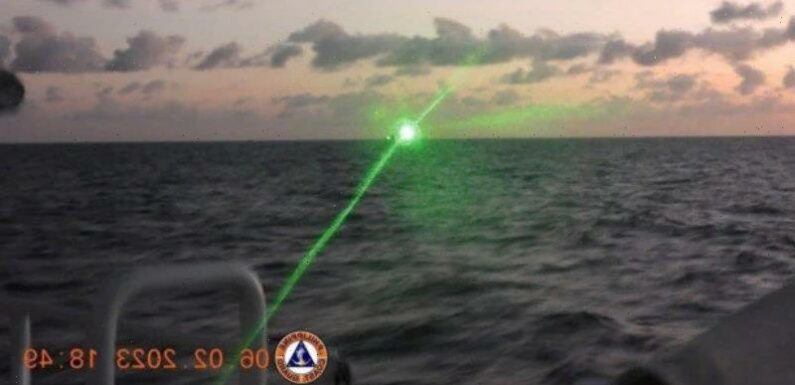
Singapore: The United States has slammed the shining of a military-grade laser by a Chinese ship on a Philippine vessel as a threat to regional peace in the latest inflammatory incident in the South China Sea.
The criticism came as the prospect of a new quadrilateral security alliance between Washington, Manila, Canberra and Tokyo was canvassed.
The Philippines’ coast guard said personnel on one of its ships were temporarily blinded by a green laser that was twice aimed in its direction near Ayungin Shoal, also called Second Thomas Shoal, on February 6.
A green light appears from the direction of a Chinese coast guard ship at the Second Thomas Shoal, 105 nautical miles off the Palawan Province, Philippines, February 6, 2023 in this handout image.Credit:Philippine Coast Guard
The episode took place almost a year to the day a Chinese Navy destroyer aimed a laser at a Royal Australian Air Force plane as it ventured through the Arafura Sea and amid increasing tensions between Beijing and the Philippines over maritime sovereignty.
On Tuesday, the US State Department warned an armed attack on Philippine military aircraft or vessels, including its coast guard, would invoke its mutual defence treaty with Manila.
“The PRC [People’s Republic of China] conduct was provocative and unsafe, resulting in the temporary blindness of the crew members of the BRP Malapascua and interfering with the Philippines’ lawful operations in and around Second Thomas Shoal,” it said in a statement.
“More broadly, the PRC’s dangerous operational behaviour directly threatens regional peace and stability, infringes upon freedom of navigation in the South China Sea as guaranteed under international law, and undermines the rules-based order.”
The shoal was declared Philippines’ territory by a 2016 tribunal ruling in The Hague, but Chinese President Xi Jinping’s regime does not recognise that decision and claims much of the South China Sea is within its so-called nine-dash line.
Wang Wenbin, a spokesman for the Chinese Ministry of Foreign Affairs, said the reef fell within China’s Nansha Islands and the Philippines’ ship had intruded without permission.
“In accordance with China’s domestic law and international law, including the United Nations Convention on the Law of the Sea (UNCLOS), the China coast guard ship upheld China’s sovereignty and maritime order and acted in a professional and restrained way,” he said.
“We hope the Philippine side will respect China’s territorial sovereignty and maritime rights and interests in the South China Sea and avoid taking any actions that may exacerbate disputes and complicate the situation. China and the Philippines are in communication on this through diplomatic channels.”
While the use of lasers has caused a new flare-up, Filipino fishermen also continue to be hassled by Chinese vessels in what Manila calls the West Philippine Sea.
Philippine President Ferdinand Marcos jnr has vowed not to cede an inch of his country’s waters. And because Taiwan, another potential flashpoint, is close to his country’s maritime borders, he has moved to strengthen military ties with the US and Japan.
The US and Philippines agreed this month to resume joint patrols in the South China Sea. Access to four extra Philippines military bases will be granted to the US, whose armed forces rotate through the south-east Asian archipelago as part of their visiting forces agreement.
Marcos also talked up the chance of a similar arrangement with Tokyo during a five-day visit last week in which the idea of a three-way security deal between the US, Japan and the Philippines was flagged.
It is a proposed grouping that could additionally include Australia, indicated Francis Tolentino, the vice-chairman of the Philippines’ Senate foreign relations committee. Australia also has a visiting forces agreement with the Philippines.
“For me, my thinking is this could not only be a triad, but this could already be a quad,” Tolentino told radio station dzBB in a comment reported by the Philippine Inquirer.
Australia, the US and Japan are already members of a quadrilateral security pact with India, which China has decried as a vehicle to resist its rise.
Indonesia, this year’s chair of regional bloc ASEAN, has expressed ambitions to accelerate negotiations for a long-awaited and elusive South China Sea code of conduct.
– with Bloomberg
Most Viewed in World
From our partners
Source: Read Full Article
